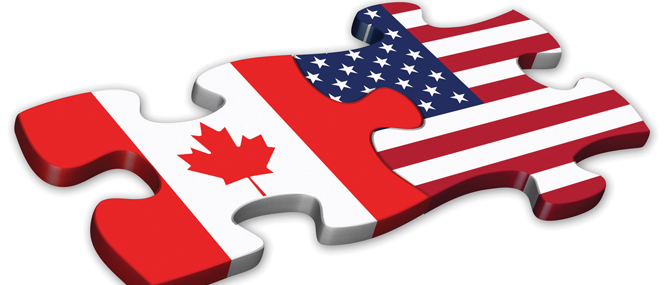Completing its investigations into Canadian softwood lumber imports, the U.S. Department of Commerce (DOC) recently found in favor of domestic producers. The DOC made affirmative determinations of illegal trade practices by Canadian producers in both the antidumping duty (AD) and countervailing duty (CVD) cases.
The combined final determination rates (both AD and CVD) as announced by the DOC are the following: Canfor 22.13%, Resolute 17.90%, Tolko 22.07%, W. Fraser 23.76% and Irving 9.92%. The combined rate for all others is 20.83%, which is lower than the combined rate of 26.75% announced earlier this year with the government’s preliminary determination.
Two Governments Take a Stand, Continue to Work for New Agreement
U.S. officials did address their attempts to find a compromise on a new Softwood Lumber Agreement (SLA).
“While I am disappointed that a negotiated agreement could not be made between domestic and Canadian softwood producers, the United States is committed to free, fair and reciprocal trade with Canada,” said Commerce Secretary Wilbur Ross. “This decision is based on a full and unbiased review of the facts in an open and transparent process that defends American workers and businesses from unfair trade practices.”
The DOC determined that exporters from Canada have sold softwood lumber the United States at 3.20% to 8.89% less than fair value. It also determined that Canada is providing unfair subsidies to its producers of softwood lumber at rates from 3.34% to 18.19%.
The trade cases were brought by U.S. sawmill and lumber interests led by the U.S. Lumber Coalition (Coalition). Jason Brochu, co-chair of the Coalition, stated, “We are pleased the U.S. government is enforcing our trade laws so that the U.S. lumber industry can compete on a level playing field.”
Brochu added, “The massive subsidies the Canadian government provides to its lumber industries have caused real harm to U.S. producers and their workers. With a fair-trade environment, the U.S. industry, and the 350,000 hardworking men and women who support it, have the ability to grow production to meet much more of our country’s softwood lumber demand.”
Chrystia Freeland, Canadian minister of foreign affairs, and Jim Carr, Canada’s minister of natural resources, stated, “The Government of Canada will continue to vigorously defend our industry against protectionist trade measures. Our forest sector is innovative, environmentally responsible and globally competitive.”
The two Canadian officials countered, “The U.S. Department of Commerce’s decision on punitive countervailing and anti-dumping duties against Canada’s softwood lumber producers is unfair, unwarranted and deeply troubling. That is why we announced an $867 million action plan to support affected workers and communities and to chart a stronger future for our workers.”
Canadian government officials are planning on meeting with provincial leaders to discuss their legal strategy moving forward. If both governments do not reach a new SLA, expect for a long legal battle, and the Canadians have had good success in the courts in previous softwood lumber disagreements. And Canadian officials have asked for a panel review of the lumber duties under Chapter 19 of the North American Free Trade Agreement (NAFTA). Chapter 19 establishes a panel of five arbiters, agreed upon by both countries, who will decide if the duties meet U.S. law. This mechanism has come under fire from the Trump administration, and is one thing that U.S. officials have wanted to limit and negotiate on during NAFTA renegotiation talks.
According to Reuters, a Canadian government official recently commented that Canada could decide to take its case to the WTO as well, in addition to the NAFTA challenge. This legal challenge is not a surprise given the importance of the U.S. softwood market to the Canadian economy.
The Process Ahead
Upon publication of the final affirmative AD determination, the DOC will instruct U.S. Customs and Border Protection (CBP) to collect cash deposits equal to the applicable final weighted-average dumping rates. If the U.S. International Trade Commission (ITC) makes an affirmative injury determination, Commerce will instruct CBP to resume collection of cash deposits equal to the applicable subsidy rates.
The DOC also found in the anti-dumping duty investigation that “critical circumstances” exist with respect to Resolute, Tolko, West Fraser, and “all-others” but did not exist for Canfor. Consequently, the DOC will instruct CBP to impose provisional measures retroactively on entries of softwood lumber from Canada, effective 90 days prior to publication of the preliminary determination in the Federal Register, for the affected producers and exporters.
With regard to the scope of the investigation, the DOC determined that certain softwood lumber products certified by the Atlantic Lumber Board (ALB) as being first produced in the Provinces of Newfoundland and Labrador, Nova Scotia, or Prince Edward Island (the Atlantic Provinces) from logs harvested in these three provinces should be excluded from the scope of the AD and CVD investigations.
Also, finished products are not covered by the scope of this investigation. Examples include: I-joists; assembled pallets; cutting boards; assembled picture frames; garage doors.
The International Trade Commission (ITC) is scheduled to make its final determinations on or about December 18, 2017. If the ITC makes affirmative final determinations that imports of softwood lumber from Canada materially injure, or threaten material injury to, the domestic industry, the DOC will issue AD and CVD orders. If the ITC makes negative determinations of injury, the investigations will be terminated. At this point, it seems highly likely that ITC will rule in favor of U.S. producers as it did earlier in the year.
The combined AD and CVD rate for the industry is 20.83%, As we understand it, the CVD continues to be suspended until the ITC makes its final determinations. But the AD remains in place, and is now being assessed at the new rate of 6.5% for all others besides those companies that filed company specific data.
For more information on the recent announcements, visit https://goo.gl/KTZ5Gk




